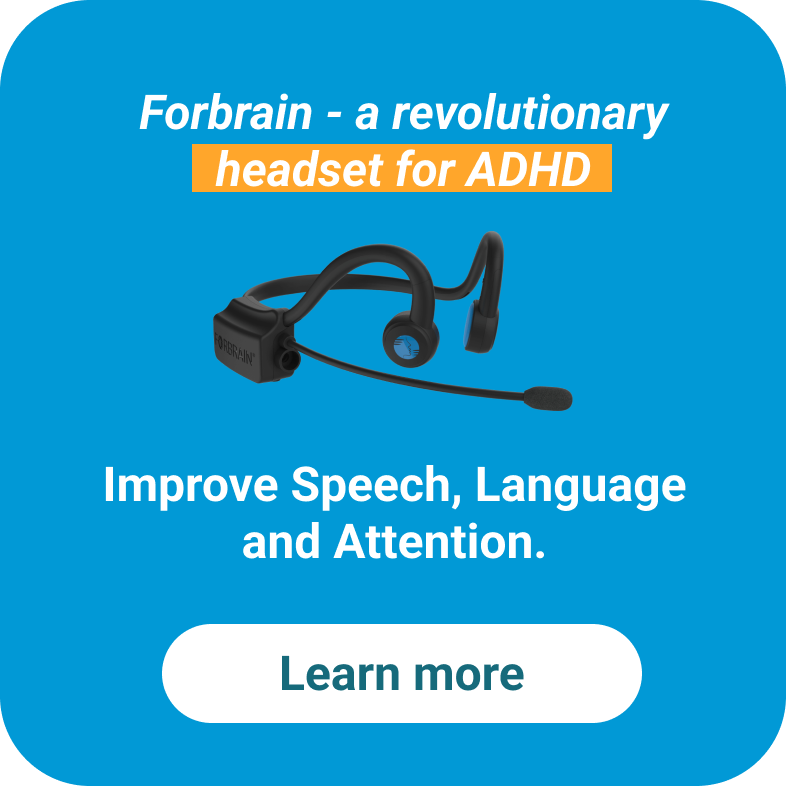ADHD and Forgetfulness: Insights and Tips on How to Deal with It
 Amanda Unrau
Amanda Unrau Speech-Language Pathologist
September 11, 2023

Does ADHD Make You Forgetful? | Is Forgetfulness a Sign of ADHD? | The Impact of ADHD Forgetfulness | Factors Contributing to Forgetfulness in ADHD | Tips to Help with ADHD Forgetfulness | The Difference Between ADHD and Regular Forgetfulness | Using Forbrain
ADHD (Attention Deficit Hyperactivity Disorder) is a developmental disorder that negatively impacts a person’s focus and attention skills. ADHD affects individuals in many ways. Many people with ADHD seem to have trouble remembering things. Is forgetfulness a sign of ADHD? Yes, forgetfulness is one of the signs of ADHD. Many individuals with dyslexia have difficulty remembering things or recalling information. In this article, we will discuss how forgetfulness impacts people with ADHD and what can be done to combat it.
Does ADHD Make You Forgetful?
ADHD can lead to forgetfulness because it affects the brain’s ability to process and store information effectively. This happens when short-term information, which is meant to be temporarily held and used, isn’t properly encoded, leading to challenges in retaining it for the long term. As a result, recalling this information later becomes difficult. Individuals with ADHD often struggle with both encoding new information and retrieving it when needed, which can contribute to difficulties in remembering things.
Is Forgetfulness a Sign of ADHD?
Just because someone is forgetful, it doesn’t necessarily mean they have ADHD. However, forgetfulness can at times be attributed to ADHD.
Here are some signs of forgetfulness that are related to ADHD:
- Impulsivity, inattention, and hyperactivity
- Poor academic achievement
- Disorganization
- Difficulty processing emotions
- Weak or limited social relationships
The Impact of ADHD Forgetfulness
ADHD forgetfulness impacts individuals in a number of ways. Below are some ADHD forgetfulness examples:
- Not remembering to bring a lunch to school
- A student forgetting to tell their parents about a form that needs to be reviewed, signed, and returned
- Poor performance on tests due to inability to remember and recall the information
- Being late or missing forgotten appointments
- Losing things often
- Stopping midway through a task because you forgot what you were doing
- Forgetting what someone told you right after they told you
Factors Contributing to Forgetfulness in ADHD
Although it is unlikely that there is one cause of ADHD, there are several factors that can contribute to the likelihood of ADHD. Below are several factors that contribute to forgetfulness in ADHD:
Neurobiological factors
Alpha waves are brain waves that filter the sensory information taken in from our environment. These waves allow us to narrow our attention to only what we want or need to focus on. Research has shown that this alpha modulation is weak in individuals with ADHD. This means that those with ADHD have difficulty blocking out distractions and separating the unnecessary from the important information.
Genetics
Genetics seem to predispose certain individuals to ADHD. Siblings or children of those with ADHD are more likely to have ADHD than other children. The genetic variants that contribute to the risk of ADHD impact the communication between brain cells and cognitive functions related to learning and language skills.
Psychological factors
There is a theory that executive dysfunction contributes to ADHD. Executive function skills include self control, planning, reasoning, focusing on a task, working memory, and monitoring behavior. These processes regulate and manage other cognitive functions, including language, learning, and action. This theory proposes that ADHD symptoms are a result of weak executive control. Studies have found structural differences in the area of the brain that manages executive function.
Environmental factors
Although the environment does not directly cause ADHD, some environmental factors can contribute to ADHD. Examples of risk factors for ADHD include exposure to chemicals or substances such as alcohol or tobacco in utero, premature birth or low birth weight, exposure to environmental toxins such as lead, mercury, or pesticides, and certain illnesses or diseases such as bacterial meningitis or encephalitis.
Tips to Help with ADHD Forgetfulness
How should you handle ADHD forgetfulness? There are several tools and strategies that can help. Consider the following options:
Meditate
Meditation and mindfulness can help individuals with ADHD manage their symptoms. Specifically, it can help your brain improve at initiating alpha waves. It can improve attention, memory, and emotional regulation. In order to do this successfully, you should ground yourself, observe your thoughts, scan your body, and bring your wandering thoughts back to your breath and body. If you need some assistance to help you kick off a meditation practice, there are Youtube videos that you can follow. There are also many apps available to provide you with guided meditations. Local yoga studios often offer meditation classes.
Use Notes/Planners
Many people benefit from writing things down, and those with ADHD can find this especially helpful. Students may need to take extra notes in class or ask for the instructor’s outline. Make a to-do list to plan for an upcoming trip, including any errands that you need to run, items that need to be purchased, as well as a packing list. A planner can help you keep track of your week and remember any upcoming appointments.
Use Alarms
Alarms aren’t just for waking up in the morning. You can use alarms as reminders for just about anything. Set a reminder for an hour before an appointment. Set an alarm to remember to make an important phone call. Alarms can also be used as reminders throughout the day for routine tasks.
Use Technology
There are a variety of apps available to help people remember things. Here are some examples. Evernote is a way to take and organize notes. Due is a way to set reminders. Todoist allows you to make and organize your to-do lists. SimpleMind Pro helps to organize your thoughts and ideas overall. Other apps, such as Lumosity or Brain Yoga, can also be used to train your brain and strengthen memory.
Use Visual Reminders
Children especially find visual reminders helpful. If you notice that your child or student is having a hard time remembering when or how to complete a task, write up instructions with pictures. Write out the steps for a morning or bedtime routine. Pictures can also be put up to remind children where to put things away so that they don’t get lost.
Games
Certain games can help improve memory skills. They are also a fun way to improve in this area. Just as physical exercise makes your body stronger, exercising your mind strengthens your memory. Although it is hard, you need to keep working on improving your memory. Memory, Simon Says, and Concentration are all great options. Keep challenging yourself and increase the difficulty level as you progress.
Use Mnemonics
You can use different types of tricks, or mnemonic devices, to connect new information to prior knowledge. There are a variety of mnemonics, so an individual with ADHD can use the one that works best for them. Here are a few examples:
- Acrostic: One of the most common mnemonic devices is an acrostic, in which each letter in an idea is assigned a word so that a sentence is created. An example of this is Every Good Boy Does Fine, which is used to remember the notes in the treble clef when reading music (E-G-B-D-F).
- Chunking: Chunking is organizing information into smaller groups, such as the way a phone number is given (435-9988).
- Music: Make up a song by setting the information to the tune of a song you already know.
- Rhyming: Rhymes are also used to remember, such as “I after E except after C,” which is used to remember the order of letters when spelling.
Medication
Medication can be used to control ADHD symptoms. Medication can also be combined with other psychosocial or behavioral interventions. Some individuals experience side effects, such as decreased appetite and weight loss, headaches, stomachaches, and poor sleep. Most medications must be taken for at least a year for them to be effective in improving overall functioning. Any benefits from the medication do not continue when the medication is stopped.
Consider Your Diet
The food and beverages you consume can play a part in your ADHD forgetfulness. Caffeine, artificial colorings, and certain food additives can negatively impact your memory. Try to limit or cut out your consumption of these things and do your best to stick to whole foods or meals and beverages without added flavorings or chemicals.
The Difference Between ADHD and Regular Forgetfulness
ADHD forgetfulness and regular forgetfulness are not exactly the same. Although there are some similar characteristics, it is important to remember that not everyone who struggles with a poor memory has ADHD.
Here are some ways to differentiate between those who have ADHD and those who do not:
- ADHD forgetfulness is more pervasive and consistent. You will see that individuals with ADHD will struggle to remember things across environments and modes. For example, those without ADHD may have difficulty remembering things presented orally. Those with ADHD will struggle to remember things presented visually and orally.
- Forgetfulness can lead to disorganization. Those without ADHD may have disorganized supplies or a messy desk. Those with ADHD will often have disorganized thoughts and writing skills as well. They may have difficulty expressing themselves.
- ADHD forgetfulness may lead to procrastination. Individuals with ADHD find it hard to initiate and complete tasks, so they may avoid or put them off. Forgetful people without ADHD can be better at completing tasks.
Using Forbrain to Help with ADHD and Forgetfulness
Forbrain is another tool that can be added to any intervention listed above. Forbrain is an auditory stimulation headset that allows an individual to hear themselves as they speak louder and more clearly. Individuals with ADHD can use Forbrain to improve their memory since it helps with attention and concentration. Forbrain can lead to improved focus, which can also help with memory skills.
Final Words
Pay attention to signs of forgetfulness in individuals with ADHD. These are areas of struggle that may present themselves in other ways. Now that you know the common ways that forgetfulness presents itself in children with ADHD, you can find ways to help those children. As parents, educators, and healthcare professionals, you can employ any of the above strategies to help improve the memory of children with ADHD.
References
ADDitude. (2023, January 30). Like a Personal Trainer for Your Brain. ADDitude. https://www.additudemag.com/slideshows/brain-training-apps-like-lumosity/
Charach, A., Fernandez, R. (2013, May 28). Enhancing ADHD Medication Adherence: Challenges and Opportunities. Current Psychiatry Reports, 15(371). https://doi.org/10.1007/s11920-013-0371-6
Doyle, A. (2022, June 22). The 11 Best ADHD Apps. Healthline. https://www.healthline.com/health/adhd/top-iphone-android-apps
Foxe, J.J. & Snyder, A.C. (2011, July 5). The role of alpha-band brain oscillations as a sensory suppression mechanism during selective attention. Front. Psychology, 2(154). doi: 10.3389/fpsyg.2011.00154
Green, R. (2022, March 25). ADHD Symptom Spotlight: Forgetfulness. Verywell Mind. https://www.verywellmind.com/adhd-symptom-spotlight-forgetfulness-5221878
Johnson, K, A., Wiersema, J. R., & Kuntsi, J. (2009, March 3). What Would Karl Popper Say? Are Current Psychological Theories of ADHD Falsifiable?. Behavioral and Brain Functions, 5(15). https://doi.org/10.1186/1744-9081-5-15
Jones, H. (2023, October 24). ADHD and Memory Loss – How Memory is Affected and How to Manage Forgetfulness. Verywell Health. https://www.verywellhealth.com/can-adhd-cause-memory-issues-5207991
Marie, S. (2021, September 23). Environmental Causes of ADHD: Is It Nature or Nurture? Healthline. https://www.healthline.com/health/adhd/environmental-causes-of-adhd#other-factors
Psych Central. (2022, March 21). The Best Meditation Strategies for ADHD. PsychCentral. https://psychcentral.com/adhd/adhd-meditation





